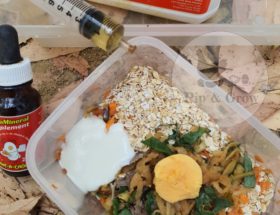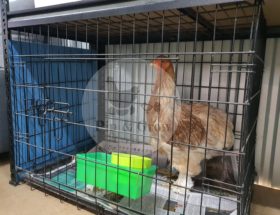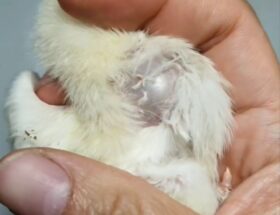Creating a first aid kit for chickens is a proactive way to ensure you’re prepared to handle common health issues that may arise in your flock. Here’s a comprehensive list of items we maintain in our first aid box. It’s important to note that we are professional breeders caring for a larger number of chickens compared to average backyard keepers. While you may not require everything listed, there are several essentials worth considering for your chicken first aid kit.
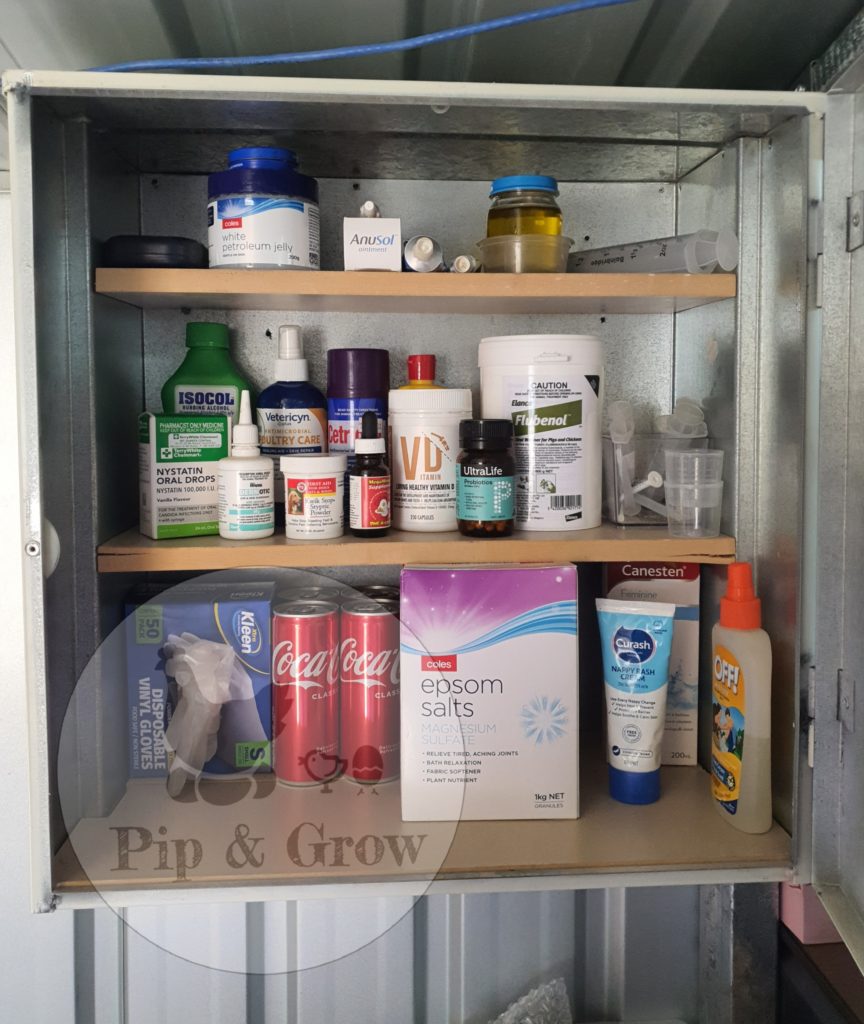
- Latex gloves: Disposable gloves can help prevent the spread of germs and protect both you and your chickens during medical care.
- Sterile saline solution: Use to flush wounds or clean eyes if needed.
- Antiseptic solution or wipes: For cleaning minor wounds and preventing infection. Centrigen spray is great for this.
Betadine – While effective, we advise against using it on chickens unless the bird is fully isolated due to its orange-red color, which can attract other chickens to peck at the wound even more. - Antibiotic ointment: Helps prevent infection in minor cuts and wounds. We use Teramycyn pinkeye powder for open wound or eye injury.
- Styptic powder or gel: To stop bleeding from minor cuts or broken toenails.
- Vitamin & mineral drops : To address vitamin or mineral deficiency.
- Electrolyte solution: Helps re-hydrate sick or stressed chickens.
- Vaseline or Petroleum jelly: Useful for dry comb, flaky skin, and treating scaly leg mites. leg mites.
- Epsom salt: Use for bathing chickens with leg injuries or those that are egg-bound.
- Olive oil: For treating impacted crop or egg-bound issues.
- Hemorrhoid cream: Useful for treating prolapse.
- Vitamin E capsule and avian vitamin or mineral drop containing Selenium: To address wry neck or neurological issues.
- Vitamin D capsule: Assists with calcium deficiency as calcium requires vitamin D to be absorbed. Note that excessive vitamin D intake can be toxic for chickens.
- Ilium Ear Drops: Use for treating ear infections.
- Nilstat Oral Drops: Used for treating sour crop or yeast infection. This medication is intended for human babies, and while there is no definitive proof of its safety for chickens, it is widely used by many backyard keepers.
- Coke: Used to assist with impacted crop. The theory is that the acidity in the coke may help break down blockages in the crop. Additionally, the sugar content in coke can provide energy to the chicken while it is withholding food.
- Nappy cream: Used to help keep the skin dry.
- Wormer: All of our birds are wormed every 3 months, so there is always one ready to be used.
- General Antibiotic: While we do not use antibiotics on our birds for respiratory illness, it may be a different story for others, which is why it is not pictured.
Triple C or Oxymav B are commonly used for treating common bacterial respiratory infections in chickens. However, these over-the-counter antibiotics are readily available from pet stores and fodder shops and often have a short expiry date. If you live in an area where stores are nearby, it may not be worth keeping these antibiotics on hand, purchase them when needed. However, it may be worth keeping them if you live in a rural area where access to stores may be limited.
Read more : Use of Antibiotic – Oxymav & Triple C - Amprolium or Cocciprol: These medications are used for the prevention and treatment of coccidiosis, a common intestinal disease in chicks. We would recommend keeping one around if you are raising chicks that aren’t vaccinated for coccidiosis. It’s essential to administer these medications according to the recommended dosage instructions. Avoid over or under-dosing, prepare only enough solution to be consumed within 24 hours, and provide a fresh solution for the best outcome.
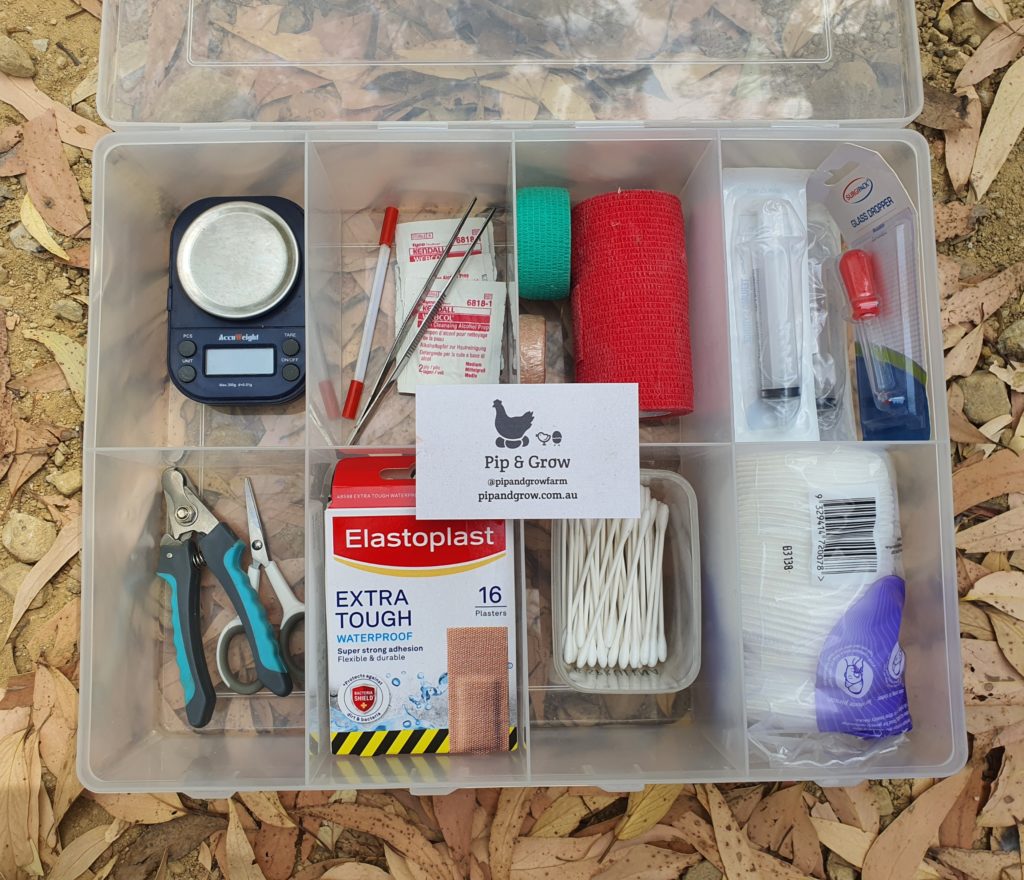
- Scissors: Useful for cutting bandages, tape, or other materials as needed.
- Tweezers: Handy for removing splinters, debris, or small objects from wounds.
- Bandages and gauze pads: Use to dress wounds or protect injured areas.
- Cotton buds and pads: Useful for applying ointments, cleaning wounds, or gently removing debris from affected areas.
- Vet wrap or cohesive bandage: Provides flexible and self-adhesive bandaging for wrapping wounds or securing dressings.
- Nail clippers or a nail file: To trim overgrown nails or sharp spurs.
- Drug scale and measuring cups: Essential for accurately measuring out the correct amounts of medications or supplements for your chickens’ needs.
- Disposable syringes: Useful for administering medications or fluids orally.
- Veterinarian contact information: Have the contact details for a poultry-savvy veterinarian readily available in case of emergencies.
- Heat source: A heat lamp, hot water bottle or warming pad can be useful for providing warmth to sick or injured chickens.
- Blanket, or towel: Can be used to gently restrain chickens for examination or treatment.
While a first aid kit can be helpful in addressing minor issues and emergencies, it’s crucial to remember that it’s not a substitute for professional veterinary care. If you’re unsure about your chicken’s health or the appropriate course of action, consulting a veterinarian is always the best approach. Internet searches and anecdotal experiences can vary widely, and a qualified veterinarian can provide accurate diagnosis and treatment tailored to your chicken’s specific needs.
